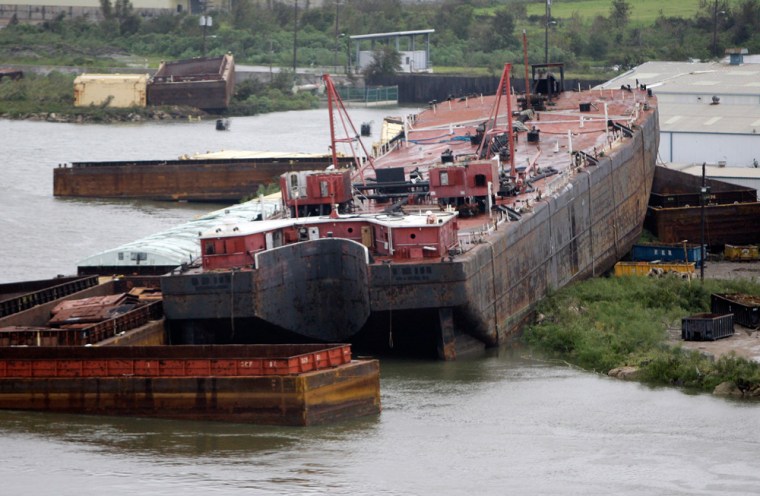Residential and commercial insurance claims could total $4 billion to $10 billion. More than a million customers, including some refineries, lack electricity. And retailers are gearing up for a burst of sales once residents who fled the Gulf Coast return.
Snapshots of Hurricane Gustav’s economic impact revealed Tuesday that the storm was hardly as damaging as feared — particularly for the region’s vast network of energy facilities. But it will be days, if not weeks, before business as usual returns.
While Gustav’s force paled in comparison to Hurricane Katrina, which cost insurers $41 billion, oil workers, utility crews, fishermen and other business owners fanned out across the Gulf Coast Tuesday to assess damage and make preparations to restart operations.
Outside a Lowe’s in Houma, La., 34-year-old sales manager Britt Coyle said there was only minor damage to the store, which he expected to be open on Wednesday to sell chainsaws, generators and other necessities to residents returning home.
For the moment, there were no customers in sight, and power outages in the area were widespread.
At the nearby Jolly Inn restaurant, the owners had a diesel generator powering their refrigerator in order to prevent thousands of dollars worth of food from spoiling. Forty-five-year-old Denise Prosperie-Fritch, whose family owns the Jolly Inn and rode out Gustav inside the restaurant, said the establishment is insured but that they only have one or two days worth of diesel fuel left to keep the food cold.
“We will be addressing our hardest-hit policyholders first,” Elizabeth Stelzer, a spokeswoman for Nationwide Mutual Insurance Co., said. “Those homes with a tree through a wall, an exposed roof, or other claims in which the home has become uninhabitable are the priority.”
Meanwhile, utilities started dealing with the task of restoring power. Utility giant Entergy Corp. said 826,000 customers, mostly in Louisiana, were without power. A Royal Dutch Shell-owned refinery in Convent lacked power late Tuesday, as did the company’s chemical plant in Geismar. The power outages also brought down cellular and Internet service in parts of Louisiana.
Entergy did not have an estimate on when power may be restored, saying it could be weeks in some instances. “Our transmission system has had massive damage,” Entergy spokesman Mike Burns said, noting damage to 191 transmission lines and 210 substations that affected 825,000 customers, mostly in Louisiana.
Gustav also created problems for the region’s Gulf Coast oyster industry.
Mike Voisin, owner of an oyster processing plant in Houma and president of the Louisiana Oyster Task Force, said Louisiana won’t be producing oysters for at least a week to 10 days, depending on how quickly officials can ensure oyster beds have not been contaminated by floodwaters carrying bacteria. Similar closures were announced in Alabama and Mississippi as Gustav approached.
Residential and land-based commercial losses, including costs associated with business interruption, were expected to total between $3 billion and $7 billion, Newark, Calif.-based Risk Management Solutions Inc. estimated. The firm estimated damage to oil platforms and wells, as well as production interruption caused by wind and waves, at about $1 billion to $3 billion.
Insurance industry analysts warned that computerized data on insurance losses may understate actual costs because the figure don’t include damage to uninsured property or destruction caused by actions excluded from some policies, such as flooding. Total losses won’t be known for months.
Still, there were signs that the region held up better than expected:
- Preliminary indications were that Gustav caused little physical damage to the region’s onshore and offshore energy-production facilities.
- Port of New Orleans spokesman Chris Bonura said damage appeared to be light, and that the Mississippi River was already open to some traffic Tuesday morning.
- In the Louisiana coastal fishing village of Cocodrie, where the storm made landfall Monday morning, there was little evidence of widespread destruction. There were colorful, expensive-looking second homes, fishing shacks and trailer homes built high up on stilts. Some were damaged by wind, but few appeared to have flooded. One small house had part of its roof and a wall torn away, revealing a man’s clothes still hanging in a closet.
- Crowley Maritime Corp., which operates container ships, tugs and barges, said its shipping facilities in Lake Charles, La., and Gulfport, Miss., areas remained closed Tuesday, but spokesman Mark Miller said, “We fared pretty well. We’re happy about that.”
- In Mississippi, regulators say the 11 casinos along the Gulf Coast will remain closed until crews finish cleaning up from the storm and an adequate number of employees return to work. Larry Gregory, executive director of the Mississippi Gaming Commission, said Tuesday that none of the casinos suffered any structural damage from Gustav.
Insurance officials acknowledged that the first damage estimates following a hurricane can come in high.
“When you provide initial numbers there’s no goal, but you do tend to error on the comfort side,” said Tom Larsen, senior vice president of the Oakland, Calif.-based Eqecat Inc.
Katrina, which struck three years ago last month, was the single largest natural disaster loss in the history of the insurance industry. Insurers paid $41 billion arising from 1.7 million claims for damage to homes, businesses and vehicles to policy holders in six states. Hurricane Andrew — the previous record holder — produced $15.5 billion in losses in 1992 and 790,000 claims.
